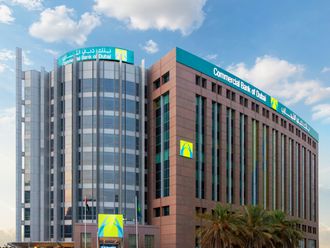HSBC Holdings Plc, Europe’s largest bank, said first-quarter profit rose 4.4 per cent, beating analysts’ estimates, as revenue at its securities unit rose and bad-loan provisions dwindled.
Pretax profit rose to $7.1 billion (Dh26 billion) from $6.8 billion a year earlier, HSBC said on Tuesday. That beat the $5.8 billion average estimate of five analysts compiled by Bloomberg. The investment bank reported pretax profit of $3.04 billion, up from $2.9 billion a year earlier, while provisions for souring loans fell 29 per cent to $570 million in that period.
“Our business recovered well in the first quarter following a difficult fourth quarter,” Gulliver, 56, said in the statement. The investment bank “had its usual strong start to the year” and “loan impairment charges were significantly lower” in Europe and North America, he said.
Chief Executive Officer Stuart Gulliver has been cutting costs and selling businesses to bolster earnings, while spending billions in dollars to boost internal compliance. Unlike Barclays Plc and Royal Bank of Scotland Group Plc, HSBC didn’t need to make further provisions in the quarter to cover the cost of settling probes into the rigging of currency markets.
The shares fell 1.7 per cent to 635.50 pence at 10.10am in London after rising as much as 1.4 per cent in earlier trading. They have increased about 4.4 per cent this year. Standard Chartered Plc, the London-based bank which also generates most of its earnings in Asia, has gained 11 per cent.
Revenue Rises
Adjusted revenue increased 4 per cent to $15.4 billion, while operating expenses rose 6 per cent to $8.5 billion in the quarter.
The bank didn’t make fresh provisions to cover fines for global probes into the rigging of currency markets. Barclays took a 800 million-pound ($1.2 billion) charge in the first quarter, while RBS set aside 334 million pounds, bringing British banks’ total provisions to more than $1.7 billion.
HSBC took a $139 million provision at the global private banking division, without giving details. The lender has been embroiled in scandal over allegations its Swiss private bank helped drug cartels and arms dealers launder money, while advising customers on how to evade tax. HSBC also set aside $137 million for a UK customer redress program.
With regulators stepping up scrutiny in the wake of the financial crisis and rising fines, British banks have been restructuring businesses and seeking ways to shore up their capital buffers. HSBC is among lenders required to split consumer banking from riskier trading businesses by 2019, while also facing stricter stress tests later this year.
Bank Levy
HSBC said it generated $4.6 billion of capital from profit in the first three months of the year, helping it fund an interim dividend and strengthen its common equity Tier 1 capital ratio, a measure of financial strength, to 11.2 per cent from 11.1 per cent at the end of December. The interim dividend was $0.10 per share.
HSBC was hit the hardest by Chancellor of the Exchequer George Osborne’s budget earlier this year, with tax increases costing banks 5.3 billion pounds over the next five years. The bank is reviewing whether to move its headquarters out of Britain, Chairman Douglas Flint told shareholders last month.
The UK bank levy on balance sheets cost the firm 750 million pounds ($1.1 million) last year. The Labour Party have pledged to increase the tax if they win elections this week.
HSBC said return on average ordinary shareholders’ equity, a measure of profitability, was 11.5 per cent, compared with 11.7 per cent for the same period a year ago. Gulliver is seeking for the measure to exceed 10 per cent, compared with the 12 per cent to 15 per cent range set in 2011, when he took over as CEO.
Investors will be looking to the bank’s strategy on June 9, when it could provide an update on its cost-cutting program and plans to sell business units, according to Chirantan Barua, an analyst at Sanford C. Bernstein Ltd. in London with an outperform rating on the stock.
“You never know what is the political positioning right now for this bank,” Barua said. “So let’s see. Wait for election and see what they have to say in June.”











